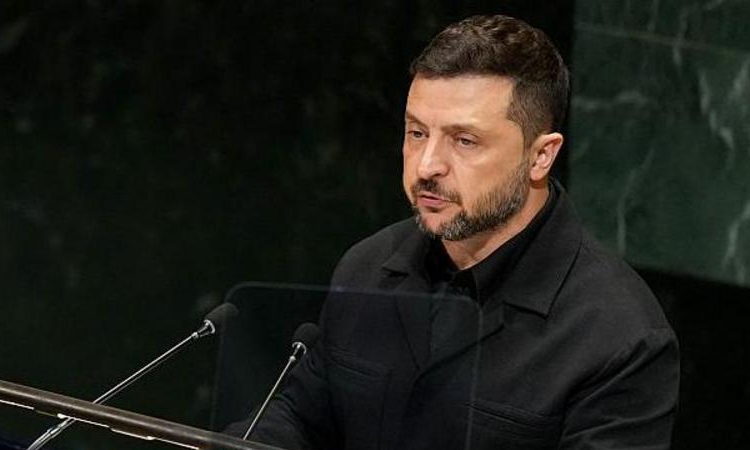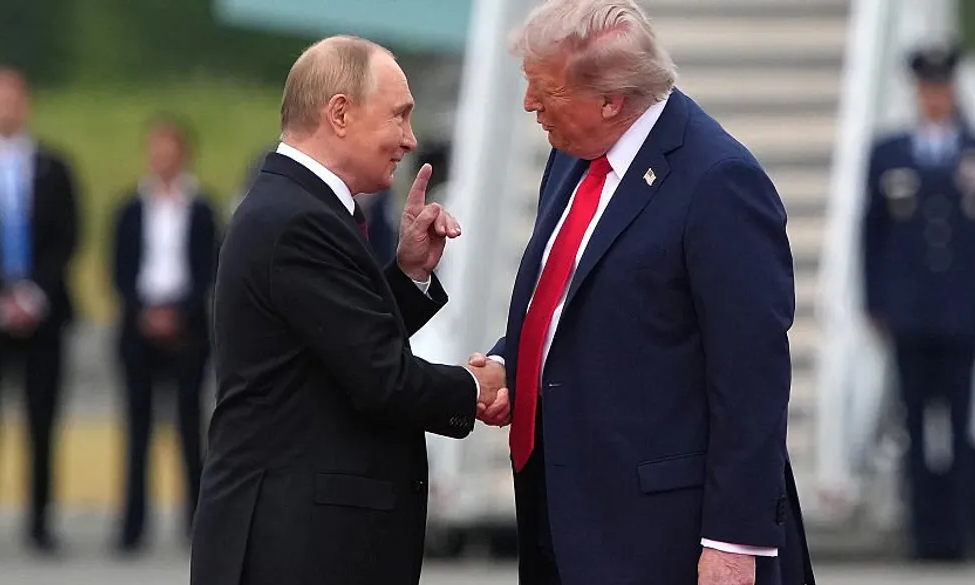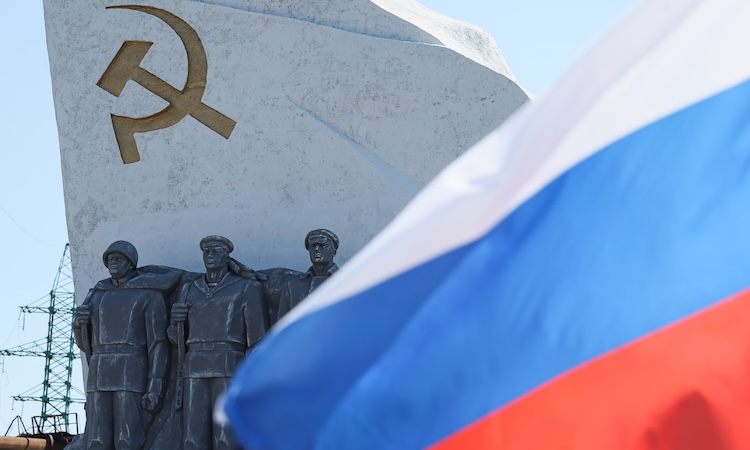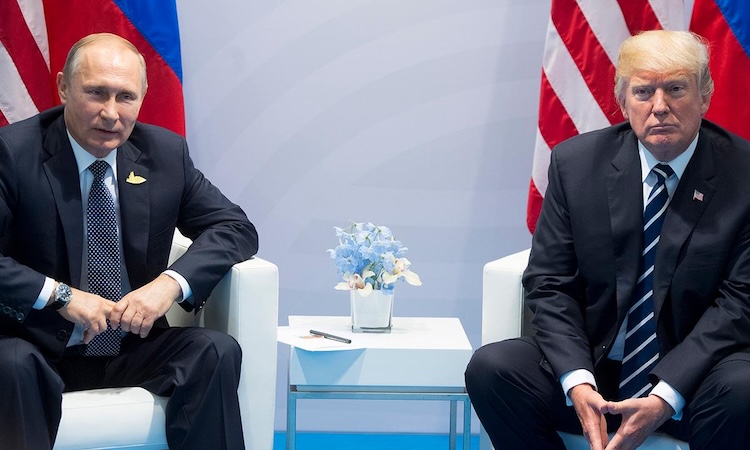The crushing defeat of the west’s proxy forces in Ukraine has kicked the door open to an eventual possible diplomatic solution to the immediate conflict, one that addresses Russia’s legitimate security concerns (namely the aggressive expansion of Nato up to Russia’s borders), advances the denazification of Ukrainian society, and guarantees measures to prevent any future imperialist meddling in the region.
No such positive outcome is guaranteed, or is even likely, but at the least the unceremonious dumping of both Brussels and Kiev from the talks draws a clear line dividing the current negotiations from the mendacious travesty of the Minsk process, whose sole purpose was to string Russia along whilst Kiev replenished its forces – as was freely attested to by Angela Merkel in retrospect.
Whatever else may come out of Riyadh, it is unlikely to be Minsk Three.
It is the military victory of the Russian anti-imperialist forces on the field of battle that alone has cracked open the diplomatic logjam, not the ‘transactional’, ‘deal breaking’ bluster of the temporary inhabitant of the White House. Sooner or later, the rifts between the European Union and the US/UK, and those within the EU itself, would have continued growing incrementally, driven on by the overproduction crisis.
But it must be admitted that the sheer brutal vulgarity with which Donald Trump slammed the door on Volodymyr Zelensky, chucking him out of the Oval office in full public view, and then proceeding to ban both Zelensky and the EU from the Riyadh talks, leaving it to the hapless General Kellogg to break the news to the Europeans, made of Trump a peculiarly effective tool of history.
Little of substance has so far been agreed to in Riyadh, at least in public. America floated the idea of a partial temporary ceasefire as regards energy infrastructure (something similar to this had been broached on three earlier occasions by Moscow, without effect). The Russians were happy to work with a limited ceasefire extending over 30 days, signed on 18 March. However within hours of this agreement coming into force, Kiev forces acted to sabotage its implementation.
“On the night of 19 March 2025, several hours after the high-level Russian-American talks were completed and after the president of the Russian Federation accepted the US president’s offer to temporarily cease strikes at the Ukrainian power infrastructure, the Kiev regime launched a deliberate attack by three fixed-wing UAVs at a power infrastructure facility in Stanitsa Kavkazkaya.” (Ukraine still rejects temporary, energy related ceasefire deal, Moon of Alabama, 19 March 2025)
Further violations followed thick and fast, making it clear that Kiev had no intention of accepting in good faith agreements made between the USA and Russia.
On 25 March, the White House announced that in principle Kiev and Moscow were both ready to sign up to a deal to restore safe passage to commercial shipping in the Black Sea. Moscow made it clear, however, that such an agreement could work only if the west first lifts sanctions on Russian banks and reconnects them to the Swift international payments system.
President Trump responded by throwing his toys out of the pram, blathering that President Putin was a liar and was “pissing him off”. His hopes of winning through diplomacy what he cannot secure by the agency of his proxies on the battlefield are clearly not prospering. Meanwhile, until Washington shows itself ready to seriously discuss the terms of Kiev’s surrender (for that is what is really at issue in these ‘peace talks’), the war continues to grind on.
Kiev’s ill thought-out incursion into the Kursk region, driven by the vain hope that these stunts will play well on the media and strengthen Kiev’s hand in talks, in practice result only in the encirclement of thousands of Kiev’s troops, trapped in ‘cauldrons’, and the weakening of the Donbass front line as troops were transferred to shore up the flagging Kursk adventure.
Macron and Starmer want to play at soldiers, at their peril
The Minsk school of pretend talks is now dead and buried, buried for good by the victorious Russian liberation forces. There is no turning the clock back to a world in which Russia could be lied to with impunity, where Russia’s insistence on security guarantees can be written off as so much flannel. This new reality needs to be understood by leaders like President Emmanuel Macron in France and Prime Minister Keir Starmer in Britain, who talk airily about sending boots on the ground to Ukraine, supposedly to act as ‘peacekeepers’.
The USA is more concerned about making the US ‘great again’ than sorting out the shambles in Europe. So entrenched is the postwar axiom that, in the last resort, the USA will always be there to come to the rescue, there are still clowns who believe that, so long as they call themselves peacekeepers, they will have a charmed life.
But according to The Telegraph on 23 March, the British army is already sending out distress signals: “Senior British military officials have firmly rejected Prime Minister Keir Starmer’s proposal to deploy British troops to Ukraine as part of a so-called ‘coalition of the willing.’
“According to reporting by the Telegraph, top defence sources have dismissed the idea as ‘political theatre’, claiming it lacks strategic clarity and fails to consider the operational realities on the ground. One senior source accused the prime minister of speaking prematurely, stating, ‘Starmer got ahead of himself with talk of troops on the ground without knowing what he was talking about.’
“Another senior figure within the military questioned the practicality of sending a peacekeeping force without a clearly defined purpose. Talks of deploying an international contingent of 10,000 troops to western Ukraine have reportedly stalled, not least because of confusion about what such a force would actually be tasked with. ‘What can a 10,000-strong international force based in the west of the country, more than 400km from the front line, do? They can’t even defend themselves,’ the official said.” (Starmer’s Ukraine peacekeeping plan dismissed as ‘political theatre’ by Danielle Sheridan, 23 March 2025)
It remains to be seen what headway President Macron is able to achieve in his grandiose scheme to get EU members to line up behind the so-called ‘coalition of the willing’. He has convened a series of meetings in Paris of European and Nato leaders to discuss Ukraine and security in Europe. Anticipating the third such conclave, booked for 27 March, Macron said: “We will finalise our work on short-term support for the Ukrainian army, on defending a sustainable and durable Ukrainian army model to prevent Russian invasions, and then on the security guarantees that European armies can provide.”
So with a wave of the hand, the French president wipes the slate clean and ignores the experience of three years’ worth of fruitless efforts to forge just such a Ukrainian army model, culminating in the said army’s comprehensive thrashing at the hands of the liberation forces.
Refusal to learn from history brings with it real perils. President Putin has repeatedly made it clear that any deployment of foreign troops in Ukraine, with or without blue helmets, will be understood as a hostile act of war and will be crushed by the liberation forces accordingly.
Starmer and Macron may dream about a new ‘coalition of the willing’ ready to take over from Washington and resume the push against Russia and China as if nothing of note had occurred. But they cannot dream away the huge blow that has been dealt against imperialism, and particularly against European imperialism, by the crushing defeat of the proxy forces in Ukraine.
Sabotage of the German economy
Signally absent from the Macron/Starmer dream team is Germany, which has more pressing problems to tackle – namely, the implosion of the national economy.
When German workers survey the wreck of Germany’s once-powerful industrial economy, with factories closing or mothballed, millions out of work and landmark German companies fleeing the country, they are right to blame the ruling elites which have caused this by a policy of subordinating Germany’s national interests to America’s ill-starred adventure in Ukraine.
The recent elections, which effectively returned those same elites to power, have nothing to offer workers other than more of the same, and only owe their temporary stay of execution to the current divisions between ‘left’ and ‘right’ wings of the anti-EU and antiwar populist revolt. A similar electoral pattern obtains in French politics, reflecting the growing revolt against EU/Nato domination.
Hungary carves for herself
Hungary’s Viktor Orbán has long been a thorn in the side of the bureaucrats in both Nato and the EU, resisting attempts from both to erode Hungary’s sovereignty and pressurise it into bankrolling Project Ukraine.
In contrast to Germany bankrupting herself to pay for Project Ukraine, Hungary is carving for herself and broadening her commercial and diplomatic relations. Whilst BMW reported that net profits slumped more than a third last year, the Chinese electric car manufacturer Build Your Dream (BYD) has announced plans to begin production of its cars in the Hungarian town of Szeged.
“When it came to the final decision for BYD’s new factory site, the choice was between Hungary and Germany, with the EV company finally settling on Hungary after 224 rounds of negotiations with the Hungarian Investment Promotion Agency,” according to the official blog of the cabinet office of the prime minister.” (BYD Szeged promises ecosystem development and a significant economic boost for the area by Luca Albert, Budapest Business Journal, 6 April 2025)
To add spice to the mix, China’s BYD is in hot competition with Elon Musk’s Tesla, whose stock has shrunk by 25 percent on the year to date. Comically Musk, a vocal champion of Trump’s tariff wars, is now suddenly assailed by doubts.
“Elon Musk’s Tesla has warned that Donald Trump’s trade war could expose the electric carmaker to retaliatory tariffs that would also affect other automotive manufacturers in the USA. In an unsigned letter to Jamieson Greer, the US trade representative, Tesla said it ‘supports fair trade’ but that the US administration should ensure it did not ‘inadvertently harm US companies’.” (Tesla tells US government Trump trade war could ‘harm’ EV companies by Mark Sweney, The Guardian, 14 March 2025)
No such tender concerns prevented the criminal gutting of the one-time economic powerhouse of Germany.
Whilst Starmer and Macron run about trying to lash together a coalition of the willing – willing, that is, to send thousands of young men to a certain death in Ukraine – others may look to the future in a multipolar world in which the likes of Hungary, Russia, China, Iran and Brics are recognised, not as public enemies, but as brother nations, trading partners and peaceful cohabitants of a common earth.
















